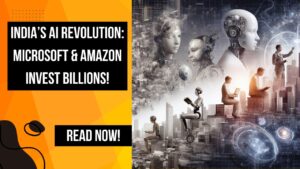
In the ever-evolving landscape of technology, Machine Learning (ML) stands as a cornerstone of innovation, reshaping industries and revolutionizing the way we leverage data. As a subset of Artificial Intelligence (AI), machine learning algorithms empower systems to learn from data, identify patterns, and make predictions without explicit programming. From predictive analytics to personalized recommendations, ML applications permeate diverse sectors, driving efficiency, productivity, and competitive advantage.
Understanding Machine Learning:
At its core, Machine Learning revolves around the concept of training algorithms to recognize patterns and make decisions based on data inputs. Unlike traditional programming, where explicit instructions dictate system behavior, ML algorithms adapt and improve over time through exposure to new data. This process, known as “learning,” enables machines to autonomously identify insights, optimize processes, and make informed decisions.
Types of Machine Learning:
Machine Learning algorithms can be broadly categorized into three main types:
- Supervised Learning: In supervised learning, algorithms are trained on labeled datasets, where each data point is associated with a specific outcome. Through this process, the algorithm learns to map input data to the correct output, enabling tasks such as classification and regression. Supervised learning finds applications in spam detection, image recognition, and predictive modeling.
- Unsupervised Learning: Unsupervised learning involves training algorithms on unlabeled data, allowing them to discover hidden patterns or structures within the dataset. Clustering, dimensionality reduction, and anomaly detection are common applications of unsupervised learning. This approach is particularly useful for exploratory data analysis and understanding complex datasets without predefined labels.
- Reinforcement Learning: Reinforcement learning revolves around the concept of learning through trial and error. Agents interact with an environment, taking actions to maximize cumulative rewards while learning optimal strategies over time. Reinforcement learning powers applications such as autonomous driving, game playing, and robotic control, where agents must make sequential decisions in dynamic environments.
Applications of Machine Learning:
Machine Learning finds applications across a multitude of industries, driving innovation and unlocking new possibilities:
- Finance: In the financial sector, machine learning algorithms analyze vast amounts of market data to identify trends, predict stock prices, and manage risks. Algorithmic trading, fraud detection, and credit scoring are among the many applications of ML in finance, enabling institutions to make data-driven decisions in real-time.
- Healthcare: Machine Learning is revolutionizing healthcare by enabling predictive analytics, disease diagnosis, and personalized treatment planning. Medical imaging analysis, drug discovery, and patient risk stratification benefit from ML algorithms, improving clinical outcomes and enhancing patient care.
- E-commerce: Personalized recommendations, dynamic pricing, and customer segmentation are key drivers of success in the e-commerce industry. Machine Learning algorithms analyze user behavior, preferences, and purchase history to deliver tailored shopping experiences, driving customer engagement and loyalty.
- Manufacturing: In manufacturing, ML algorithms optimize production processes, predict equipment failures, and enhance quality control. Predictive maintenance, supply chain optimization, and demand forecasting leverage machine learning to streamline operations and reduce costs.
- Marketing: Machine Learning empowers marketers to analyze consumer behavior, segment audiences, and optimize advertising campaigns. Sentiment analysis, churn prediction, and customer lifetime value estimation drive targeted marketing strategies, improving ROI and maximizing customer acquisition.
Challenges and Opportunities:
Despite its transformative potential, Machine Learning faces several challenges that must be addressed to unlock its full benefits:
- Data Quality and Quantity: ML algorithms require large, high-quality datasets to learn effectively. Data collection, preprocessing, and labeling are critical steps in the ML pipeline, and inadequate or biased data can lead to suboptimal performance and unreliable predictions.
- Interpretability and Explainability: As ML models become increasingly complex, understanding how they arrive at their decisions becomes more challenging. Ensuring transparency and interpretability in ML algorithms is essential, especially in high-stakes domains such as healthcare and finance.
- Ethical and Social Implications: Machine Learning raises ethical concerns related to privacy, fairness, and bias. Algorithmic biases can perpetuate discrimination and inequity, highlighting the importance of fairness-aware ML and responsible AI practices.
- Robustness and Security: ML models are susceptible to adversarial attacks, where subtle perturbations to input data can cause unexpected behavior. Ensuring robustness and security in ML systems is crucial to mitigate risks and maintain trustworthiness.
Despite these challenges, Machine Learning presents vast opportunities for innovation and advancement across various domains:
- Automation and Efficiency: ML algorithms automate repetitive tasks, streamline processes, and optimize resource allocation, driving efficiency and productivity across industries.
- Personalization and Customization: Machine Learning enables personalized experiences tailored to individual preferences and needs, enhancing customer satisfaction and loyalty.
- Predictive Insights: ML algorithms forecast future trends, identify opportunities, and mitigate risks, empowering organizations to make data-driven decisions with confidence.
- Scientific Discovery: Machine Learning accelerates scientific research by analyzing complex datasets, uncovering hidden patterns, and generating novel hypotheses.
Future Perspectives:
As Machine Learning continues to advance, fueled by innovations in algorithms, hardware, and data availability, its potential for transformative impact will only grow. From autonomous vehicles and smart cities to personalized medicine and intelligent virtual assistants, ML promises to reshape industries, enhance human capabilities, and unlock new frontiers of innovation.
Conclusion:
Machine Learning represents a paradigm shift in the way we harness data, empowering systems to learn, adapt, and evolve autonomously. From predictive analytics and personalized recommendations to process optimization and risk management, ML applications permeate every aspect of our lives, driving efficiency, innovation, and growth. As we continue to push the boundaries of what is possible with machine learning, we embark on a journey towards a future defined by intelligence, automation, and limitless potential.






